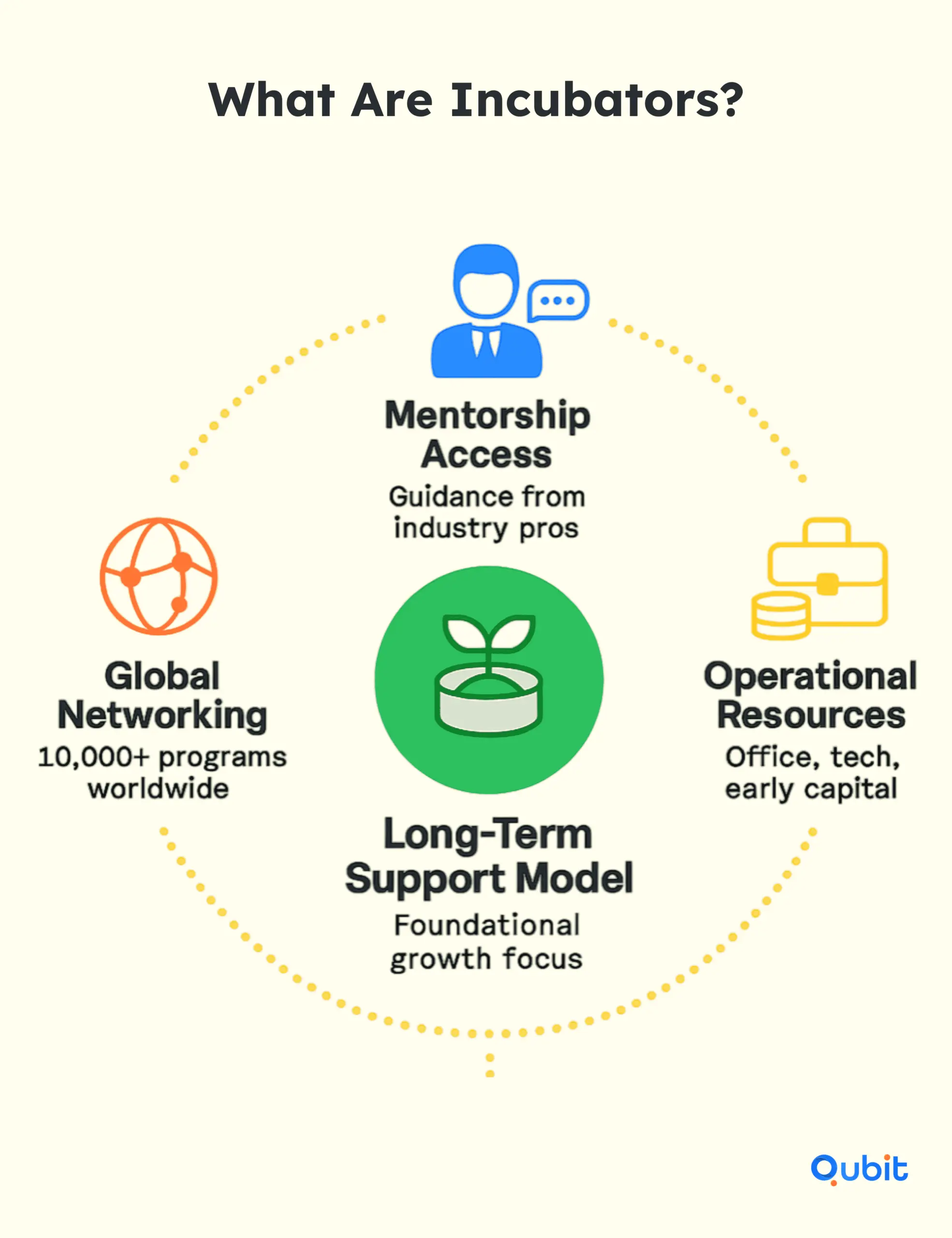Startup incubators have become a cornerstone for early-stage businesses seeking structured growth and support. These programs, including initiatives like the HubSpot startup program, provide startups with essential resources such as mentorship, funding, and networking opportunities. With 87% of incubator participants remaining operational after five years, the impact of these programs is undeniable.
Your exploration is enriched by considering startup fundraising strategies, which interweave various approaches for acquiring capital to support diverse growth phases.
This blog will unpack the role of incubators in accelerating growth, their selection criteria, and the metrics that define their success. Let’s jump right in!
What Are Startup Incubators and How Can They Help You?

Startup incubators serve as nurturing grounds for early-stage ideas, transforming them into sustainable business models. Unlike accelerators, which focus on rapid growth and scaling, incubators emphasize long-term development by providing startups with the foundational tools they need to succeed. These programs are tailored to support entrepreneurs during the critical early phases of their journey.
One of the defining features of startup incubators is their emphasis on mentorship. Experienced industry professionals guide founders through challenges, offering insights that help refine business strategies and avoid common pitfalls. Additionally, incubators provide access to essential resources such as office space, technical support, and funding opportunities, creating an environment where startups can thrive without the burden of high initial costs.
Networking is another cornerstone of incubator programs. By connecting startups with investors, industry leaders, and other entrepreneurs, incubators open doors to collaborations and partnerships that might otherwise be out of reach. With over 10,000+ incubators globally, as highlighted in recent research, these programs have become a vital part of the startup ecosystem, fostering innovation across industries.
Startup incubators are more than just programs—they’re catalysts for turning ideas into impactful businesses. Whether through mentorship, resources, or networking, they equip entrepreneurs with the tools to navigate the complexities of building a startup.
How to Choose the Best Incubator for Your Startup
Selecting the right incubator can significantly impact your startup’s trajectory. With numerous options available, understanding key factors ensures alignment with your business goals.
1. Geographic Location and Regional Advantages
The incubator’s location plays a pivotal role in your startup’s growth. Proximity to industry hubs can enhance networking opportunities and provide access to local investors. For example, startups in tech may benefit from incubators in Silicon Valley, while those in healthcare might thrive in regions with strong medical research facilities.
2. Industry Focus and Specialized Mentorship
Focused incubators, such as programs like HubSpot, cater to specific industries, offering tailored mentorship to address unique challenges. If your startup operates in SaaS or marketing, choosing an incubator with expertise in these areas ensures access to relevant resources and guidance.
3. Cohort Size and Program Duration
Consider the cohort size and program length. Smaller cohorts often provide more personalized attention, while longer programs allow for deeper development. Assess whether the incubator’s timeline aligns with your startup’s growth stage and objectives.
4. Leadership and Resources
Evaluate the leadership team’s experience and the resources available. Strong leadership can provide valuable insights, while resources like office space, legal support, and marketing tools can reduce operational burdens.
5. Equity Requirements
Understanding equity trade-offs is crucial. Some incubators require startups to give up a percentage of equity in exchange for funding or resources. Carefully assess whether the equity terms align with your long-term ownership goals.
How to Apply to Startup Incubators Without Stress
Applying to startup incubators can feel overwhelming, but breaking the process into manageable steps can simplify the journey. Begin by forming a solid team with complementary skills and a shared vision. A cohesive team demonstrates your startup’s ability to execute ideas effectively, which is a key factor for incubator programs.
Next, set clear business objectives. Define your short-term and long-term goals, ensuring they align with the incubator’s mission. Programs like HubSpot startup program often prioritize applicants with well-articulated plans and measurable milestones.
Conduct thorough market analysis to validate your business idea. Understanding your target audience and competitors not only strengthens your application but also showcases your commitment to long-term success. Refer to resources like Station F for specific application guidelines and program offerings tailored to startups.
Finally, remember that applying to an incubator is not just about acceptance—it’s about committing to growth. Prepare for the time and effort required to maximize the benefits of the program. For additional funding strategies during this stage, explore ways to secure capital for startup.
A well-structured application process can significantly improve your chances of acceptance, paving the way for your startup’s success.
The Best Startup Incubators and What Makes Them Successful
Startup incubators play a pivotal role in transforming innovative ideas into thriving businesses. Below are some of the world’s leading incubators, their unique models, and the factors driving their effectiveness.
Global Leaders in Startup Incubation
The best incubators are distinguished by their global reach, diverse focus areas, and proven track records. Here’s a curated list of top programs that exemplify these qualities:
Capital Factory
Based in Texas, Capital Factory focuses on fostering regional innovation while connecting startups to a robust network of investors and mentors. Its Texas-centric approach ensures localized support for entrepreneurs. Visit Capital Factory for a deeper look into Texas-focused incubator benefits.TechStars
Renowned for its global network, TechStars offers programs across various industries, including fintech, health tech, and sustainability. Startups benefit from exclusive mentorship and funding opportunities. Check out TechStars for a global network of programs and a proven track record of success.TechNexus
TechNexus specializes in bridging the gap between corporations and startups, creating synergies through collaborative mentorship. This model accelerates innovation by aligning corporate resources with entrepreneurial agility. Consider TechNexus to explore collaborative mentorship for corporate and startup synergies.
What Sets These Incubators Apart
Successful incubators share several defining characteristics:
Tailored Mentorship Programs
Personalized guidance from industry experts helps startups refine their strategies and overcome challenges.Access to Funding
Many incubators provide direct funding or connect startups to investors, addressing critical financial barriers. For more insights on overcoming such hurdles, explore fundraising challenges and solutions.Extensive Networking Opportunities
By facilitating connections with investors, partners, and peers, incubators create ecosystems that drive growth.Data-Driven Success Metrics
Programs like HubSpot Startup Program emphasize measurable outcomes, ensuring startups achieve tangible milestones.
Why Metrics Matter
The impact of incubators is validated through data-driven performance metrics. These include startup survival rates, revenue growth, and successful exits. Programs like HubSpot Startup Program exemplify how structured support can translate into measurable success.
Startup incubators are more than just resource hubs—they are catalysts for innovation and growth. By offering mentorship, funding, and networking opportunities, these programs empower entrepreneurs to turn their visions into reality.
How to Measure an Incubator’s Impact and Success
Evaluating the effectiveness of startup incubators requires a focus on measurable outcomes. Programs like Y Combinator (YC) have set benchmarks in the industry, showcasing the tangible benefits of structured incubator support. YC’s impressive track record includes funding over 1,000 startups, with approximately 30% of these companies achieving IPO status or significant growth milestones. These metrics highlight the transformative potential of incubators in fostering innovation and scaling businesses.
Success rates and IPO statistics serve as critical indicators of an incubator’s value. They validate the role of these programs in providing startups with the resources, mentorship, and networking opportunities necessary for sustainable growth.
The Best Tools and Platforms to Boost Your Startup
Connecting with investors and incubators can be a game-changer for startups aiming to scale. Platforms like Gust simplify this process by offering structured profiles that highlight your venture’s fundraising goals and market readiness. Gust allows startups to apply to multiple incubators simultaneously, saving time while enhancing credibility.
Customizable profiles on such platforms enable targeted outreach, ensuring your pitch resonates with the right audience. This tailored approach not only boosts visibility but also strengthens your startup’s position in competitive markets.
For startups exploring programs like HubSpot, integrating tools that streamline investor connections can complement broader growth strategies. By focusing on platforms that simplify applications and enhance pitch customization, startups can effectively position themselves for success.
Startup Success Stories: How Incubators Make a Difference
Airbnb’s journey from a modest idea to a global phenomenon highlights the power of incubator programs in shaping startup success. Early in its development, Airbnb benefited from specialized mentorship that refined its business model and helped the founders address critical challenges. This guidance was instrumental in transforming the company’s vision into a scalable reality.
The incubator also provided access to strategic networks, connecting Airbnb with investors and industry leaders who played pivotal roles in its exponential growth. These connections not only opened doors to funding but also fostered partnerships that accelerated the company’s expansion.
Programs like HubSpot Startup Program exemplify how tailored support can propel startups toward sustainable growth. Airbnb’s case study serves as a compelling example of how incubators can unlock potential, turning ambitious ideas into thriving businesses. To explore Airbnb’s remarkable journey further, visit Airbnb.
What’s Changing in the World of Startup Incubators?
Startup incubators are undergoing a transformative phase, driven by evolving market demands and technological advancements. Market data reveals promising growth, with projections estimating the startup incubator market to reach $12.2 billion by 2033, growing at an impressive 14.2% CAGR. This accelerated investment environment underscores the increasing importance of these programs in fostering innovation and entrepreneurship.
Emerging trends are reshaping the incubation ecosystem. Virtual incubation ecosystems, for instance, are gaining traction by offering location-independent resources, enabling startups to access mentorship and funding remotely. Additionally, sector-specific regulatory sandboxes are facilitating rapid prototyping under controlled conditions, bypassing traditional compliance barriers. These developments highlight the shift toward more adaptable and inclusive incubation models.
Programs like HubSpot startup program are also aligning with these trends, emphasizing digital-first strategies to support entrepreneurs in scaling their ventures effectively.
Conclusion
Accelerating startup growth requires a strategic approach that combines understanding incubator fundamentals, selecting the ideal incubator, mastering the application process, and evaluating success metrics. Each of these steps plays a pivotal role in ensuring your business is equipped to thrive in competitive environments.
Data-driven decisions and tailored guidance are essential for refining your strategies and achieving measurable outcomes. By focusing on these elements, startups can unlock their potential and create sustainable growth trajectories.
If you're ready to transform your startup's growth narrative, let our team help you craft a compelling pitch deck. Discover our Pitch Deck Creation service today.
Key Takeaways
• Incubators drive early-stage growth with targeted mentorship, resources, and networks.
• Choose based on location, industry focus, program size, and equity requirements.
• Top programs prove success through metrics and case studies.
• A clear application process and tools like Gust boost funding chances.
• Emerging trends point to strong innovation and long-term growth in the incubator ecosystem.
Frequently asked Questions
What is the startup incubator program?
A startup incubator program is a structured initiative aimed at supporting early-stage businesses. It provides mentorship, resources, and networking opportunities to help startups overcome initial challenges and achieve sustainable growth.


 Back
Back



